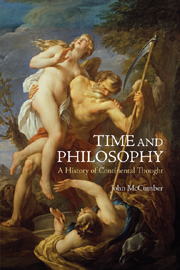Book contents
- Frontmatter
- Contents
- Acknowledgements
- Abbreviations and note on texts
- Introduction
- I Germany, 1790–1890
- 1 The collapse of Kant
- 2 Hegel discovers the past
- 3 Marx, capitalism and the future
- 4 Kierkegaard's dreadful future
- 5 Nietzsche and the boundless future
- II Germany and America, 1900–1968
- III France, 1945–2004
- IV Onwards, 2011–
- Further reading
- Bibliography
- Index
1 - The collapse of Kant
from I - Germany, 1790–1890
- Frontmatter
- Contents
- Acknowledgements
- Abbreviations and note on texts
- Introduction
- I Germany, 1790–1890
- 1 The collapse of Kant
- 2 Hegel discovers the past
- 3 Marx, capitalism and the future
- 4 Kierkegaard's dreadful future
- 5 Nietzsche and the boundless future
- II Germany and America, 1900–1968
- III France, 1945–2004
- IV Onwards, 2011–
- Further reading
- Bibliography
- Index
Summary
Immanuel Kant was hard at work – all the time. From his daily reveille at 4.55am until his bedtime at around 9.30pm, his entire day – with the exception of his afternoon walk through Königsberg, the far eastern German town in which he lived – was devoted to work. From 5.00am until 7.00am, he did his correspondence and investing. From 7.00 until noon, he lectured: five hours straight. After his walk, at around 4.00pm, he took up his labours again until fatigue forced him into bed. Even the guest lists for Kant's elaborate daily luncheon parties, which lasted for hours, were carefully designed to help Kant's work, by informing him of what was going on in scientific and political circles.
Why was Kant working so very hard? He had not always done so. As a young, and even a youngish, man, he had been known in the taverns of Königsberg as der galante Magister, the gallant master; his grace and wit transformed many a convivial evening. Why had he changed?
The reason for the gloom was the Scotsman David Hume. Hume, Kant tells us in the Prolegomena to Any Future Metaphysics, had awakened him from his “dogmatic slumbers” (AA IV, 260). In the Prolegomena, Kant talks about Hume's sceptical treatment of the notion of causality, which resulted in the view that you could not come to know a cause by reasoning backwards from its effects.
- Type
- Chapter
- Information
- Time and PhilosophyA History of Continental Thought, pp. 15 - 30Publisher: Acumen PublishingPrint publication year: 2011



